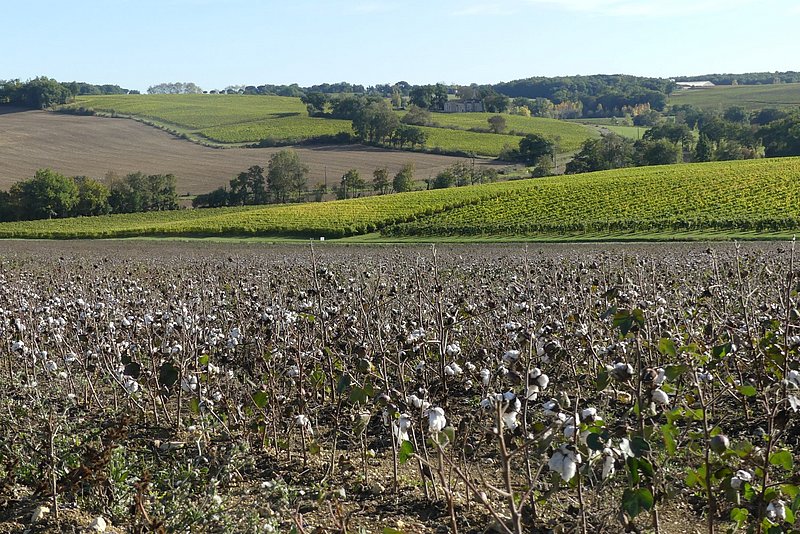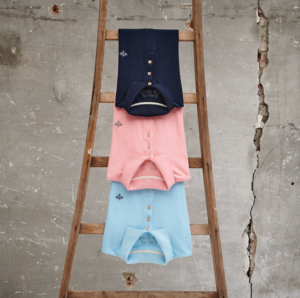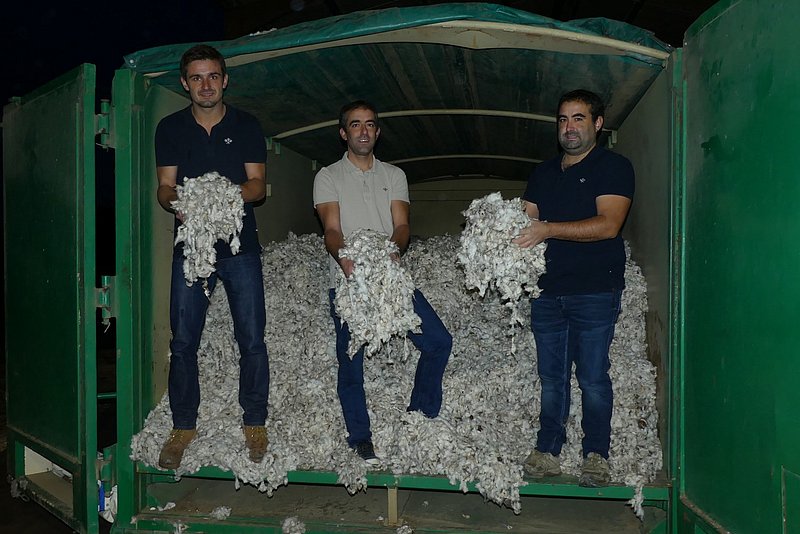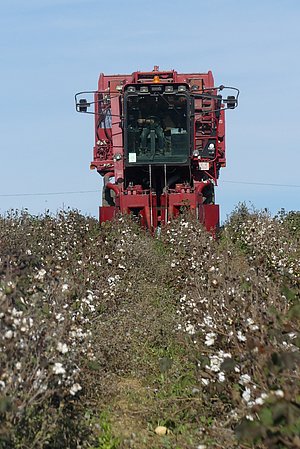A cotton farmer in France
There are a lot of HORSCH employees who are active, spare-time farmers – also in France. Yohan De Wit for example has a farm in the South West of France. terraHORSCH talked to him about his two main pillars.
Yohan de Wit has to reconcile his two passions. As a technical support of the HORSCH France sales team in the south of France he takes care of the machines, acts as a consultant and supports the agricultural machinery dealers in his sector. As the managing director of his company Jean Fil he deals with the production of cotton. This activity extends into the textile sector as this is where he is looking for customers and markets for the final products.

It surely is not always simple to switch from technology to polo shirts made of 100 % French cotton. “I try to not mix the two activites. You have to learn to clearly separate one thing from the other!“ Yohan de Wit emphasises.
But are the two activities really so far apart? “Due to my work for HORSCH I meet farmers with the most different backgrounds. I learn to understand their problems and I am interested in the solutions they realise on their farms – with regard to machines but also to agronomic strategies. As far as my activity for Jean Fil is concerned, I, too remain connected to practical farming. I test rotations, new strategies and I try to convey a positive image of farming to the French society. Thus, I can use both areas of activity to tackle one problem: the changes in modern agriculture. The restrictions for the use of plant protection agents, the risks of the corn price in the market, the sales markets, soil health, the costs for agricultural operating material and energy, the public opinion – all these points have to be tackled. For me it works very well as I am open-minded and curious.”

A farmer’s son
Yohan de Wit was almost born with an enthusiasm for agriculture. His father and his uncle, arable and livestock farmers from the Netherlands, came to the southwest of France in 1979. They took over a farm with 100 ha of cereals and 100 ha of vineyards. Winegrowing was uncharted waters for them and they first had to learn the basics. In the second generation the farm was divided. Since that time Yohan’s brother-in-law and his brother take care of 60 ha of cereals and 60 ha of vineyards while Yohan’s father cultivates the remaining land.
The farm is not very large. Thus, he has to find solutions to maximise profitability. Like many other farmers in the southwest of France he decided to grow crops with an additional value: maize, beets and rape for seed multiplication as well as popcorn maize and green beans.
In total, it was not easy to leave his home country and work somewhere else. It is even more difficult for a farmer – the more so in an unknown sector like winegrowing. Thus, Yohan grew up in an environment full of entrepreneurial spirit. But what is Yohan‘s vision of farming?
Address the customer in this everyday life
Yohan de Wit tells us: “I always have thousands of ideas. But I was afraid to hurl myself into any adventures without a backup. Moreover, it was clear to me that I did not want to work without my brother-in-law and my brother. We have been close friends since we were little and always complemented each other. Médéric et Samuel are excellent arable farmers, my strong points are in the sectors communication and processing.”
And thus, one day the idea was born to grow cotton. “We acted on a simple assumption: What do the French do every day? First: they eat, second: they drink, third: they dress. As farmers we already deliver food, as winegrowers we also supply the drinks to go with it. What if we would also clothe them? This was the origin of the idea to cover the complete chain from the production of the cotton to the finished garment.”

The beginning was not easy. Especially as they were the only ones in the whole of France who dared to tackle such an idea. The first steps were the search for the optimum variety, the carrying out of plant tests, the search for certified, European cotton seed and then die conclusion of a contract with a seed producer where multiplication was forbidden. After one test year (2016 with six grains in the garden) the team made the jump in 2017 with 2 ha. In 2018, they already farmed 4 ha and in 2019 even 14 ha.
“Of course, I am not going to reveal our production secrets“, the farmer says. “For we had to invest quite a lot of time and money to polish the rotation. Without jeopardising the cotton yields and the yields of the other crops, of course. We had to struggle with quite some initial difficulties. Now our focus is on making our investments profitable.”
The ultimate objective of this adventure is to create a product that is 100 % made in France. “This really is our hearts‘ desire as France has a very long tradition in the cotton sector. In France, we have all the technology and all the knowledge for spinning, dyeing and weaving. This must not be lost. We also want to create a connection between agriculture and industry. The latter cannot exist without agriculture! People often forget that most of the raw materials come from the earth.”
Today the producers are very proud of their cotton from Gers: Within France the cotton covers approx. 2,400 km until it becomes a polo-shirt. Normally a t-shirt in average covers more than 65,000 km before it is worn for the first time. At the moment, Jean Fil, Yohan‘s, Médéric‘s and Samuel’s company, produces 6,000 polo-shirts and t-shirts a year with a collection of ten different styles.

Necessary adaptions to climate changes
“I respect the decision of my professional colleagues who increasingly rely on organic farming. But that’s not my hobbyhorse. Society in France gets confused with regard to the quality of food and the global warming. Today, both objectives are very hard to achieve with organic farming. For this production method consumes a lot of diesel, normally cultivates the soil excessively, but does not use pesticides. Conservation farming, however, uses plant protection agents but carbon emission as well as soil erosion are considerably lower. The world is not black and white! You need a little bit of everything. A middle course between organic and conventional farming.“
“For me, the climate remains the most important topic. On our family farms we are starting to adapt our crops as we probably will have less and less water at our disposal. My opinion is based on the facts that we have been noticing on our farms since the 90s: There is a sea on our premises that 30 years ago could irrigate both my father’s and my uncle’s farm. Today it is only enough for my uncle’s farm although the size has not changed. Due to the cultivation of cotton and the oceanic climate in the southwest of France we do not depend on irrigation on my father’s farm. There is enough rainfall for our crops. Moreover, cotton is extremely heat-resistant as it is rather grown in low-moisture countries: the south of Spain, Portugal, Uzbekistan. Cotton is sown in spring as soon as the soil temperature allows for it. Harvest is carried out in November/December. The biggest problem of cotton are the insects. Especially the brown bugs that are slightly smaller than a normal bug and place their larvae in the cotton. The larvae move into the fruit and make it rot. Though there are small losses, we put up with them as there are a lot of other insects living in the cotton. And we do not want to affect those. And moreover, there still isn’t an authorised agent.”
“It took us four years to achieve satisfactory yields. We started with 80 kg of fibres per hectare. In 2020, the yield amounted to 250 kg. However, cotton yield considerably depends on the weather. Every year harvest is a close call: The warmer and dryer the weather the more comfortable is the plant. This year for example the harvest was very difficult because of rain and frost. We hope that we can save the harvest to store it.“

The three farmers also try to improve their carbon balance with conservation farming. They discuss and exchange experiences with other farmers. “It is not only about communication but also about a certain mindset. The climate change is a fact that cannot simply be ignored. At the moment we are working on a simple rotation and with cover crops. After the wheat or barley harvest we grow forage sorghum. Into this sorghum we sow beans which are broken down with a cultivator in September/October. If the conditions change, if the government fixes that the farmers have to store carbon, we have to be ready and get our strategy going as soon as possible. The objective is to improve the quality of our soils. This what I believe in!“
To optimise the use of plant protection agents, the farms invested in a HORSCH Leeb LT. They were convinced by the option to spray with a 25 cm nozzle spacing and by the boom control system as the slopes in the Gers area often have slopes of 20 %.

Adaption to the agitated times
“We decided to process a little bit less cotton in 2020 and 2021. Given the Corona situation it seemed sensible to store the raw material to be better able to judge how the consumer will behave. A brand does not only develop with the number of sold products! An optimisation phase is also part of it. And we are just right in the middle of such a phase. We want to reduce the number of cultivated land in the future to achieve the removal of the yield ceiling. We are looking for a new technical strategy to increase our production capacity for French cotton even further. The demand for it is still strong and unbroken despite the worldwide conflicts and the Covid19 pandemic.”